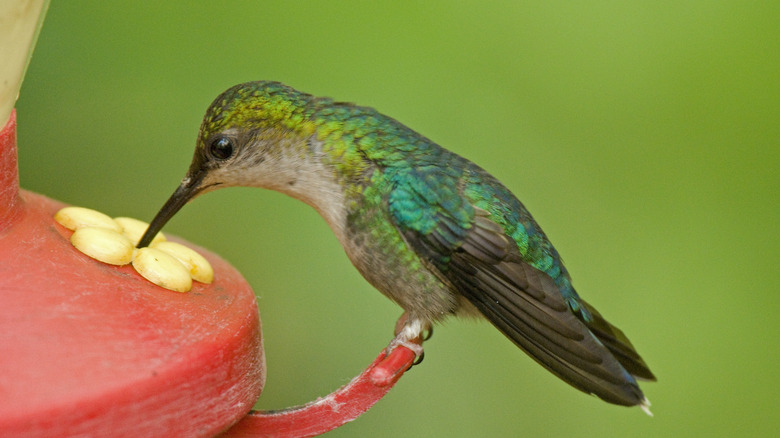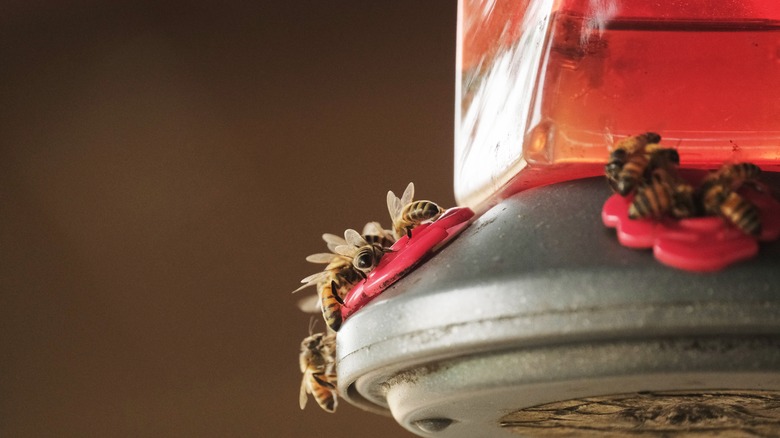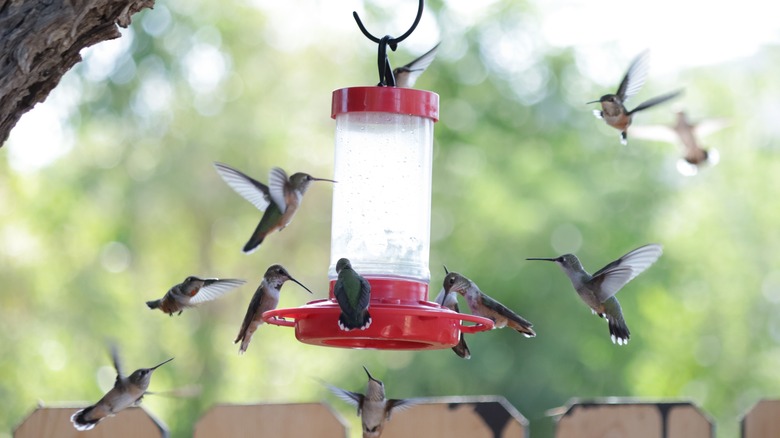Our Expert's Top Tips For Safely Dealing With Bees Around Your Hummingbird Feeder
Backyard birdwatchers and casual observers alike are often drawn to hummingbird feeders. These sweet-treat pit stops are a surefire way to attract hummingbirds to your yard as they seek out a quick snack. Unfortunately, they're not the only ones who are fond of the saccharine nectar: Bees are also attracted to the sugary liquid, as are wasps. You can keep pests like wasps away from hummingbird feeders by using nectar guards, but what about bees?
Curious about safely keeping the bees at bay, House Digest spoke with Emma Grace Crumbley, an entomologist with Mosquito Squad, about unwanted visitors. In an exclusive interview, Crumbley explained that individual bees aren't a big concern for hummingbird feeders. Instead, swarms are what you need to be aware of because they can scare birds away.
"Additionally, bees and wasps have been known to sting hummingbirds, and since hummingbirds are small, the venom can actually kill them," she explained. "If you can discourage bees from bombarding your feeders, you will be helping hummingbirds avoid a [deadly] encounter." (That's why you have to be mindful of any praying mantises at your feeder too — they can also be deadly to a hummingbird.)
Some say that putting a saucer of sugar water near a feeder will draw bees away from the feeder and toward their own treat. However, Crumbley said this might not be the case and could make the situation worse. "In fact, placing sugar water out may attract more foraging bees to your feeder, especially if the saucer becomes overcrowded with thirsty bees."
Better ways to lure bees away
There are ways to help mitigate a bee problem at a feeder, though keeping them away in general is easier said than done. In the exclusive interview with House Digest, expert Emma Grace Crumbley said that foraging insects are drawn to the sugar in hummingbird nectar. "Sugars provide energy that these insects use to help support their colonies," she explained. "Since the solution added to hummingbird feeders has a high sugar concentration, it's as attractive to the birds as it is to the bees." That makes keeping them at bay a tough task.
Crumbley suggested watching the feeder: If you see insects or bees scaring the birds away, empty the feeder and clean it well. If you leave it empty for a few days, the bees may look for food somewhere else, while the birds will keep coming back. After a few days you can fill the feeder with more nectar. If that tactic fails, or you have a lot of bees, you may need to contact a local beekeeper. "Beekeepers can relocate your colony or advise you on ways to discourage bees from your yard without harming them," she said. "If you do not know any beekeepers, contact your county's extension agency or your state's Department of Agriculture and/or Natural Resources for assistance."
Feeder mistakes to avoid
When trying to keep a hummingbird feeder safe from insects, it can be tempting to do something drastic like treat the area with chemicals and pesticides. Emma Grace Crumbley strongly advised against this for the sake of both the birds and bees. In the exclusive interview with House Digest, Crumbley said even something as simple as bleach or soap can harm wildlife. "Products can be toxic when ingested or prevent birds and bees from flying if products cover their wings," she said. That's why incorrect cleaning is one of the major errors you don't want to make with hummingbird feeders.
One way to help prevent bees from taking over the feeder is to give them something more naturally alluring. According to Crumbley, introducing bee-friendly flowers to your yard can help. "To prevent this problem in the future, consider planting flowering plants around your yard that are attractive to bees," Crumbley said. "Larger flowers with flat petals are most accessible for bees and other pollinators to land on and pollinate." Make sure to include flowers that bloom in colder weather, like primrose, pansies, and jasmine, so the bees have a food source after the spring and summer flowers are done.


